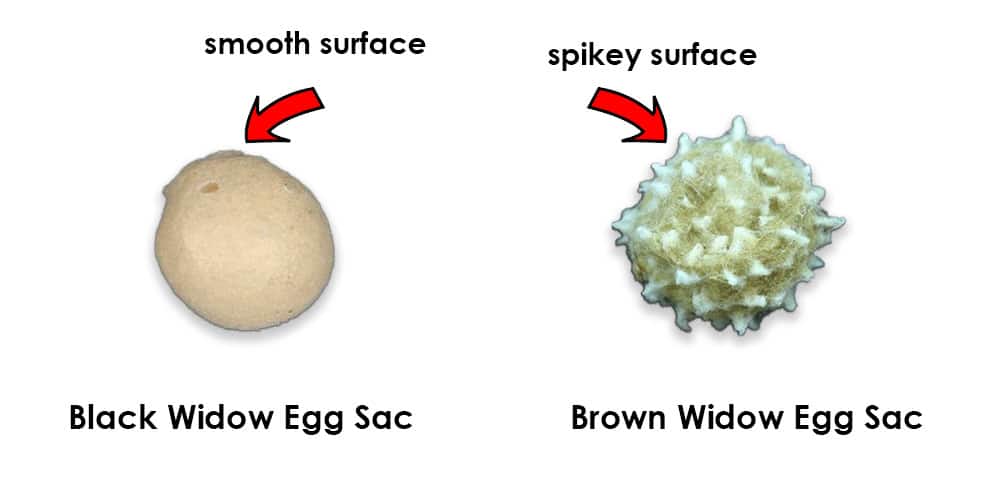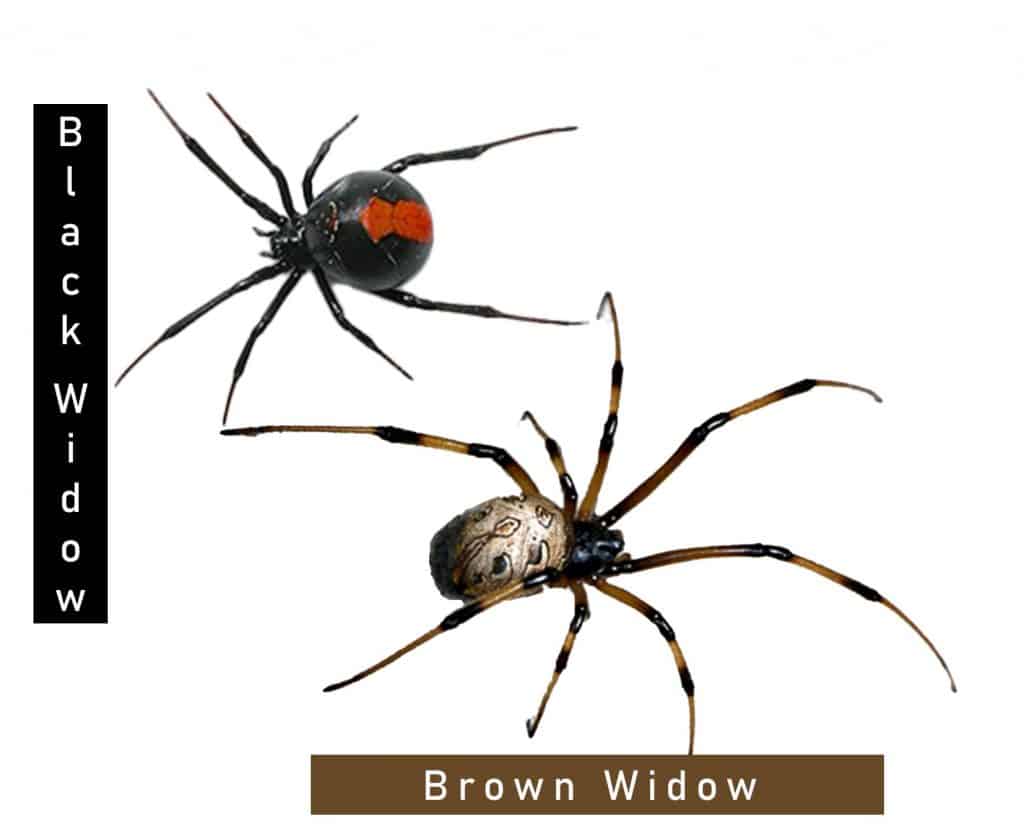Well, we know it went up the water spout, got washed out when the rain came, survived a watery death, and made its way back up the spout as soon as the sun came back out. This all seems innocent enough, unless, of course, the spider we are talking about is a Black Widow. Or its closely related Brown Widow. Yes, if the existence of Black Widow spiders wasn’t bad enough, guess what? There is a Brown Widow spider, too.
Besides all of the normal characteristics of a spider: eight legs, two main body parts, the web-making spinnerets, the ability to send people of all ages and genders running in fear, what’s the difference? Let’s break it down.
What is the difference between a Black Widow and a Brown Widow?

Their Color:
Black Widows are, you guessed it, black. Shocking I know. The females are easy to identify as they have a red hourglass shape under their abdomen. Brown Widows have various shades of brown on their body. They have a striped pattern on the top with mottled brown on the bottom. They also have red markings on their abdomen, but this is not a characteristic that is as reliable as with the Black Widow.
Breeding Habits:
Murderous little creatures, both Black and Brown Widows eat their male partner after mating. Clearly, these are females you don’t want to mess with. Brown Widows prove to be a bit more selective with their mating partner and prefer the cougars of the Brown Widow spider world. Younger Brown Widows will mate and let their baby daddies live, but older Brown Widows are all about showing who is boss and making a meal out of their men. Literally.
Their Hangouts:
Black Widows enjoy well-lit, dry places, such as that pile of firewood that is stacked in your backyard, the stack of stones you’ve been meaning to use to build a firepit, under your porch, in your barn, in your shed. You get the picture as far as the outside goes, but beware, as they are also fond of cluttered garages, crawl spaces, and basements. Brown Widows are all about the urban life. You can find them getting their chill on outside your home, in your lawn furniture, in your neighborhood park, in your kids’ outdoor toys. Between these two widows, there aren’t that many safe places.
Their Bites:
Black Widows are the mama bears of the arachnids. They will do whatever it takes to protect their eggs. If her eggs are in danger, that mama spider will strike without hesitation. If you happen to sneak up on a Black Widow and startle it or it feels threatened, beware, because it is likely you’re going to get bit before you even realize it. A bite from a Black Widow can cause a number of severe health issues, including abdominal muscle spasms, muscle pain, swelling. The female Black Widow is reported to have venom that is 15 times more potent than a rattlesnake. Victims of a Black Widow bite should seek immediate medical attention.
Unlike their kin, Brown Widows are not aggressive and will go into hiding if disturbed. Because of this, bites from a Brown Widow are rare. Brown Widow bites are usually less severe even though their venom is twice as potent as the Black Widow. The reason being that the Brown Widows don’t make as much venom, which means they inject less when they bite. Still a force to be reckoned with if for some reason their fangs find your flesh. Extreme caution should be taken should you find yourself face to face with a Brown Widow, especially if there’s a stack of eggs she’s protecting.
How to Get Rid of Black and Brown Widows:
Most spiders, Black and Brown Widows included, do this thing called ballooning, where they raise their abdomens, release a small piece of silk filament, and float to wherever the wind might take them. Could be 10 feet or 200 miles. This ballooning makes it tough for the extermination process, however, have no fear, because HowToPest.com has the products that the pros use to get rid of these and any other variety of spider that you might have.
So, whether it is a water spout, your firewood, or your kid’s ride on firetruck that has been sitting in the backyard, these not so itsy, bitsy spiders need to be washed out, with no opportunity to return.

Onslaught FastCap Spider & Scorpion Insecticide
Fast Free Shipping!
Need to get rid of spiders or scorpions? Onslaught FastCap Microencapsulated Insecticide is one of our favorites when it comes to spider and scorpion control! Why? Onslaught provides fast-acting and long-lasting residual control, which means it will hold up very well in all temperatures. Spiders, scorpions, fleas, mosquitoes and a broad spectrum of other residential and commercial pests don’t stand a chance. Shop all Spider Products Here.
Features and Benefits:
- Kills mosquitoes, including the Aedes mosquito that may carry and transmit Zika virus
- Quick kill
- Combines active ingredients Esfenvalerate, knockdown agent Prallethrin with synergist Piperonyl Butoxide (PBO) for enhanced control
- For use indoors and outdoors, including indoor broadcast treatment option
- For use in food and non-food areas of commercial structures
- For use in and around livestock facilities, on turf, ornamentals and landscapes
- Kills a broad spectrum of pests (including spiders, scorpions, fleas and mosquitoes)
Size:
- 16 oz.
- Case of 6 (16 oz.) Bottles
- 128 oz. – Gallon





